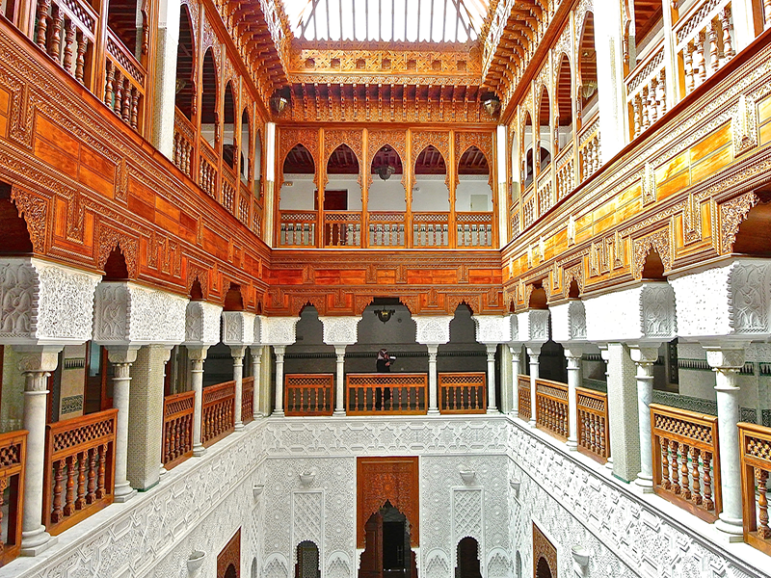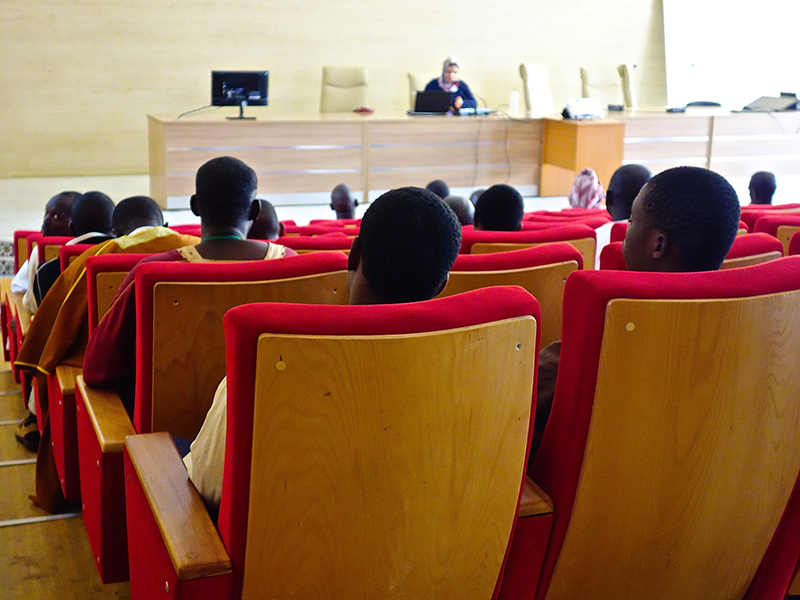Religion News Service
By Tom Heneghan
Chababe is a lively site on Facebook, YouTube and the web where young Moroccans can talk about what troubles them — sex, suicide, online harassment, violence or religious extremism.
The three-member team running Chababe — the name means “youth” in Arabic — often brings in psychologists or sociologists to discuss these issues in live webcasts. The team posts further information online and passes along names of groups around the country that youths can turn to for help.
The team also regularly calls on Islamic scholars for advice. It doesn’t have to look far — Chababe is part of Mohammadia League of Islamic Scholars, a government research institute leading Morocco’s extensive campaign against violent Muslim extremism.
Rabita (“league”), as the institute is known, has over the past decade rolled out a broad array of programs aimed at dissuading Moroccans from turning toward radical forms of Islam. Those initiatives range from video games and updated schoolbooks for children to social media like Chababe for those in their teens and 20s and improved higher education for Muslim clerics.
The aim is to update and defend Morocco’s traditionally Sufi-inspired Sunni Islam against violent groups such as al-Qaida and the Islamic State group and the spread of strict Salafist Islam. That is particularly challenging in the digital age.
“My generation is out of it — we don’t understand Snapchat, Facebook, WhatsApp or Twitter,” Rabita’s secretary general, Ahmed Abbadi, 57, admitted with a smile. “We were paying attention to what was happening on the radio, on television and in the mosques.”
But “our youths live in a cyber world, they zap right away if you don’t know how to grab their attention,” he told visiting journalists from Paris.
Morocco, at the western end of the Arab world, got firsthand experience of the extremist threat in 2003 when Salafia Jihadia, a group linked to al-Qaida, staged a series of suicide bombings in the Atlantic port of Casablanca that killed 33 people.
Shown it was not immune to the turmoil over 3,000 miles away in the Middle East, the government tightened security but also launched a broader response by updating its family law in 2006, expanding women’s legal rights and starting a pioneering training program for female preachers and religious counselors.
Rabita also began a flurry of research projects to analyze and deconstruct the arguments used by Muslim extremists, identify the target audiences they appeal to and present a counternarrative promoting Morocco’s moderate approach to religion.
In 2015, the government unveiled two new projects, one to update religious textbooks in state schools and another to provide improved higher education for future imams. Most of these students are Moroccans, but the Mohammed VI Institute in Rabat also trains candidates from sub-Saharan Africa and France.
Yassine Souidi, director of Chababe, said his three-person team has tracked social media over the past six years to identify which topics being discussed could lead to religious or other forms of radicalization.
“We check Facebook, Twitter, news and other websites to see which potential risk behaviors emerge,” he said. Once an issue is identified, young people are invited to discuss it in a webcast program called “Youths Get to Speak.”
“We’ve spoken about suicide, sexual information in social media, sexual harassment, sex education, freedom in the streets, extremism and violence, and the radicalization of youths in Morocco.”
After that, the team analyzes the exchange with a psychologist, a sociologist, a cleric or some other expert to prepare a second webcast — called “A Meeting With …” — where the expert discusses these issues with a young person.
“We’re only three people here and it’s impossible for three to change the behavior of 8 million young Moroccans,” Souidi said. So Rabita has built up a network of about 2,000 activists around the country who relay its message in local discussion groups, youth clubs or women’s centers.
Many activists hold degrees in Islamic studies and Rabita provides them with information about the issues and citizens’ rights and coaches them in leading group discussions.
“They’re not delivering Friday sermons, but if someone asks a question about religion, they can respond,” Souidi said. “They’re not doctors or psychologists, but they have contacts with those people locally.”
This “relay system” was adapted to prisons after officials reported radical prisoners were recruiting among young inmates. Instead of trying to convert the radicals, which often fails, Rabita taught prison guards how to persuade other prisoners to push back with arguments against their extremist views.
Prisoners who cooperate can become “peer educators” to train even more prisoners how to spread a moderate interpretation of Islam. “By the end of November, we will have 22,000 prisoners trained like this,” Souidi said.
“They don’t say Daesh is bad and extremists should be killed,” he said, using the Arabic acronym for the Islamic State group. “They lead discussions,” he said, and don’t tell people what to think.
When Rabita posted its guidelines for deconstructing radical arguments online, hackers — presumably extremists — promptly crashed the site, and more firewalls had to be erected to protect it, Abbadi said. “That was a good sign, because it meant it hurt,” he said.
Souidi said Rabita had closely analyzed Islamic State videos and found they sometimes used quite unreligious bait to entice youths to join their jihad.
“We have found kids who are not religious and fascinated by action films. They want to fire a Kalashnikov into the air and drive around in a 4×4. He found these videos on WhatsApp telling him where he can do that, so became an extremist.
“Another recruit was a sociologist who left for Daesh because he was bypassed for a job at his university. So he became an education official with Daesh in Syria.”
With the Islamic State close to defeat in Syria and its dream of a caliphate shattered, the group has lost its prestige among young Moroccans, several experts said. But the rigorist Salafist form of Islam that it took to violent extremes still holds some attraction.
“There is a kind of Salafism light that is spreading in schools,” said Rachid Saadi, a teacher in the provincial city of Oujda near the Algerian border. “The kids wear modern clothes and like computers, but their thinking is Salafist.”
Saudi-supported Salafists are winning seats on regional Islamic councils, said another academic who asked not to be named, and they sometimes block use of the updated textbooks the government has distributed.
“Young Moroccans are no longer attracted to Daesh but religious extremism in general is still there,” Souidi said, noting the radical group was now urging Muslims to become lone-wolf attackers in Europe.
“We don’t know if there will be another Daesh tomorrow with a different name and a different style. The form can change but the idea is still there. We still have to work on this.”










